Brandon Sanderson
Today we're officially announcing Mistborn: Birthright, an action-RPG set in the Mistborn world.
To those who have been paying close attention, much of this may not be surprising. The MB:B website went live earlier in the month, and I have tweeted several times about the impending game. In short, we're hoping to do a fun, fast-paced, action game with some RPG elements, cool Allomancy effects, and some (hopefully) killer dialogue. That last part is my job, as I'll be writing the story and most (if not all) of the game's dialogue.
The game will take place hundreds of years before the events of the books, during the early days of the Final Empire. People have often asked me if I will do prequels to Mistborn, and my response has frequently been that I won't likely write them as novels–but I might consider them for other mediums. We're going to try it here, and this will let us do some very cool things to expand the world. And yes, you get to play as a Mistborn.
The game is scheduled for fall of next year, and we're still very much in the preliminary stages of game design. That means that I don't have much to tell you other than what I wrote above. (Though the game's website will be posting screenshots and the like as they become available.)
So, since I can't tell you terribly much about the game quite yet, instead I'll tell you how it came to be. I've been keeping my eyes open for the chance to do a Mistborn game for some time; several chances arose, but they always fell through for one reason or another. I didn't want to give the rights to just anybody. I've been a gamer since my first Atari, and I wanted to do it right.
When Little Orbit first approached me, I was skeptical. I didn't recognize the company, and though they had worked on some professional projects, I didn't see anything in their pedigree that screamed Mistborn at me. However, I like to at least talk to people who are making offers on my work.
And so, I chatted with them. I met with them. And I was impressed. Not only did they have a love for Mistborn, they had more experience at this sort of thing than I'd originally assumed. The company is made up of people who have been in the business for a long time, and they had worked on a variety of games I really love. (They even have guys who were involved in the original Fallout and Baldur's Gate games.)
Their pitch materials were good and very persuasive. But the final thing that convinced me they were right came when we sat down and talked about the type of game we would make. Not only were they eager for me to be involved in the story, our discussions of what would make an awesome Mistborn game were synergistic and exciting. They envisioned the game the same way I always had.
The longer I've worked with them, the more impressed I've been. They keep their promises; they aren't just willing to let me be involved–they seem dedicated to making certain I'm pleased every step of the way. They don't need to go so far–I've said before that I feel an author shouldn't usually have control of game design, but leave that to people who know how to make fun games–but they have gone well beyond what is required of them.
These guys really, really want to make a great Mistborn game. I'm thrilled by what is coming your way when this thing is done.

